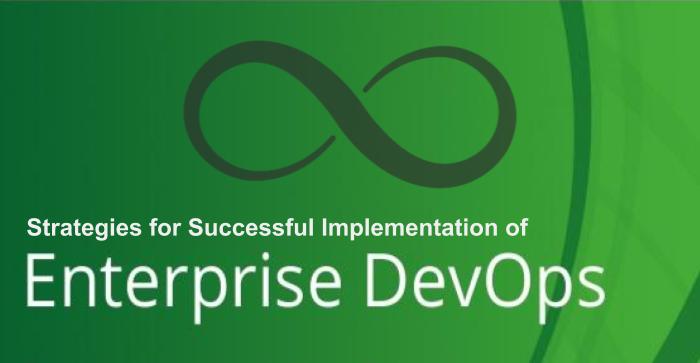
DevOps refers to the agile relationship that exists between development and IT operations. The key goal of DevOps is to improve the relationship between these units via better communication. DevOps mainly focuses on the idea of a continuous delivery pipeline, also considered as the main building block of an Agile organization.
Enterprise DevOps is the application of DevOps in an environment which has lengthy approval gates, monolithic systems, interdependent systems, lengthy waterfall-based processes among teams, error-prone workflows and security or other sorts of compliances. Adopting Enterprise DevOps will allow you to meet your customer needs, thereby enabling your organization to stay ahead in a dynamic business environment.
There are a certain number of strategies that ensure successful implementation of Enterprise DevOps and these include:
1. Ability to run agile teams across the organization
A hierarchy must be created where products, as well as value chains, exist simultaneously. The sprint teams, if they are aligned to products, should function effortlessly across the service areas of business, operations, and development for seamlessly delivering innovation, speed, and quality. These teams need to undertake the responsibility of the products within a given value chain.
2. Overall Automation
Automation needs to happen across the overall lifecycle of a service. Some of the places where automation can happen include continuous integration, continuous testing, continuous monitoring, continuous deployment, etc. For example, In the case of continuous integration, automation can happen in the code’s quality, build and unit testing. Automation in continuous testing happens in the form of regression test and UI test automation. Similarly, there are several ways by which automation can be brought into effect in continuous monitoring and deployment as well.
3. A unified team for handling both development and maintenance activities
With the help of common agile governance and an integrated product backlog, projects, fixes, and enhancements including L2, L3, L4 operations need to be managed. In other words, separate teams must be built for operations and maintenance purposes. Moreover, a mechanism should be made where the same agile teams have the capability of handling service management aspects like 24X7 support, SLAs and emergency fixes.
4. Business agility enabled via the latest infrastructure
Infrastructure platforms with a combination of cloud-native capabilities enable the building of application services and not just infrastructure services. Agile applications that are powered with native CI/CD and run on microservices can be set up in an easy manner on such platforms.
5. Multi-technology DevOps strategy
A DevOps target model must have features that revolve around the extent of automation, release speed, tooling, the nature of skills and the platform that is being used. Also, these set of features vary across a different set of technologies and also as per the systems of innovation, differentiation, and records of the given application. This is because DevOps CI/CD is highly determined by the technology platform that is used.
6. Shared KPI framework
For DevOps professionals, it is very essential that DevOps KPIs, measures and metrics are established mainly for monitoring the performance and for finding out whatever goes wrong in the process. This ensures more transparency among the members of the DevOps teams. This shared KPI framework is run by the central DevOps guild where the responsibilities, objectives, and roles concentrate on end-to-end KPIs.
7. Centralized DevOps guild
In order to push the overall DevOps strategy, a centralized DevOps team needs to be created. Moreover, a method must be devised for the functioning of the sprint teams that work across the enterprise. The strategic decision for the purpose of standardizing automation, scaling, and stack is the key responsibility of this function.
DevOps consulting companies along with their experience and skilled DevOps team help clients in achieving new business heights by speeding up the development and delivery process. These companies have all the necessary expertise in automated testing, agile management and continuous delivery that helps in creating an automated DevOps pipeline.


Thank you for any other informative blog. The place else may just I get that type of information written in such an ideal manner?
I’ve a challenge that I’m just now working on, and I have been on the glance out for such information.